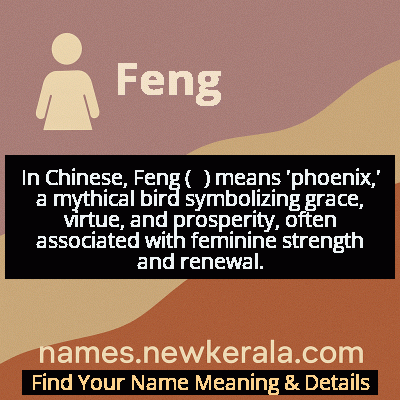Feng Name Meaning & Details
Origin, Popularity, Numerology Analysis & Name Meaning of Feng
Discover the origin, meaning, and cultural significance of the name FENG. Delve into its historical roots and explore the lasting impact it has had on communities and traditions.
Name
Feng
Gender
Female
Origin
Chinese
Lucky Number
5
Meaning of the Name - Feng
In Chinese, Feng (凤) means 'phoenix,' a mythical bird symbolizing grace, virtue, and prosperity, often associated with feminine strength and renewal.
Feng - Complete Numerology Analysis
Your Numerology Number
Based on Pythagorean Numerology System
Ruling Planet
Mercury
Positive Nature
Adventurous, dynamic, curious, and social.
Negative Traits
Restless, impatient, inconsistent, prone to indulgence.
Lucky Colours
Green, white.
Lucky Days
Wednesday.
Lucky Stones
Emerald.
Harmony Numbers
1, 3, 9.
Best Suited Professions
Sales, marketing, travel, entertainment.
What People Like About You
Versatility, charisma, adventurous spirit.
Famous People Named Feng
Feng Li
Actress
Award-winning Chinese actress known for roles in 'The Last Emperor' and 'Red Sorghum'
Feng Xiaogang
Film Director
Influential Chinese film director known for 'A World Without Thieves' and 'If You Are the One' series
Feng Tang
Writer and Physician
Renowned novelist and former McKinsey consultant, author of 'Beijing, Beijing'
Feng Zhe
Gymnast
Olympic gold medalist in parallel bars at 2012 London Olympics
Name Variations & International Equivalents
Click on blue names to explore their detailed meanings. Gray names with will be available soon.
Cultural & Historical Significance
Extended Personality Analysis
Individuals named Feng typically exhibit a unique blend of artistic sensitivity and practical resilience that mirrors the maple tree's characteristics. They often possess a deep appreciation for beauty in all forms, from nature and art to human relationships, and have a natural talent for creative expression. Like the maple that changes with the seasons while maintaining its core structure, Fengs demonstrate remarkable adaptability without compromising their fundamental values. They are often perceived as contemplative and introspective, with an innate understanding of life's cycles and transitions. This wisdom makes them excellent counselors and trusted friends who provide balanced perspectives during challenging times. Their resilience is not loud or aggressive but rather a quiet, steady strength that emerges when faced with adversity. Fengs typically have a calming presence that others find comforting, much like the shade provided by a mature maple tree. They value authenticity and depth in relationships, preferring meaningful connections over superficial interactions. While they may appear reserved initially, their inner world is rich with imagination and emotional depth, making them fascinating companions and creative collaborators who bring beauty and stability to their communities.
Modern Usage & Popularity
In contemporary naming practices, Feng maintains a distinctive position as a nature-inspired name that bridges traditional Chinese culture with modern sensibilities. While not overwhelmingly common, it enjoys consistent popularity among educated urban families who value cultural heritage and environmental consciousness. The name has seen a notable resurgence in the past decade, particularly in first-tier cities like Beijing, Shanghai, and Shenzhen, where parents are increasingly choosing names with natural elements and literary connections. International exposure through Chinese media and the global success of Chinese-born professionals has increased the name's recognition worldwide. Social media platforms have created new contexts for the name's usage, with many young Fengs building personal brands around creativity, sustainability, and cultural innovation. The name's gender association remains predominantly feminine, though occasional unisex usage occurs. Current naming trends suggest Feng will maintain its moderate popularity as environmental awareness grows and cultural preservation becomes increasingly valued among younger Chinese parents seeking meaningful names with historical depth and contemporary relevance.
Symbolic & Spiritual Meanings
The symbolic meanings associated with Feng extend far beyond its literal translation as 'maple,' encompassing rich layers of cultural metaphor and philosophical significance. In Chinese symbolism, the maple tree represents the perfect balance between strength and flexibility—its sturdy trunk withstands storms while its leaves dance gracefully in the wind. The tree's dramatic seasonal transformation from vibrant green to brilliant red symbolizes personal growth, adaptation, and the beauty found in life's transitions. Maple leaves are particularly significant in autumn, when their fiery colors represent passion, vitality, and the culmination of a growth cycle. The tree's longevity and ability to thrive in diverse conditions make it a symbol of endurance and resilience. In traditional Chinese medicine, maple components were used for their healing properties, adding connotations of restoration and natural wisdom. The tree's sweet sap, harvested through tapping, symbolizes hidden resources and the rewards of patience and careful effort. Collectively, these meanings make Feng a name that embodies transformation, natural beauty, inner strength, and the wisdom to navigate life's changes with grace and resilience—qualities that resonate deeply in both traditional and contemporary contexts.

